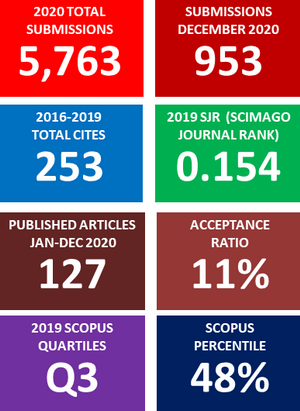VKORC1 and CYP2C9*3 Polymorphisms and Their Impacts to Acenocoumarol Dosage in Vietnamese Heart Valve Replacement Patients
DOI:
https://doi.org/10.48048/wjst.2019.6225Keywords:
Acenocoumarol, CYP2C9, Heart valve replacement patients, VKORC1Abstract
Acenocoumarol therapy has been widely used for heart valve replacement (HVR) patients in Vietnam to improve dose management of this drug. The variety of responses among patients to this drug are driven by genetic background. Hence, aim of the study is to explore the relation between acenocoumarol dosages and genetic polymorphisms of CYP2C9*3, VKORC1-1173 C>T and VKORC1-1639 G>A genes. One hundred fifty HVR patients was enrolled in this study. Blood samples were collected and analyzed using PCR and Sanger’s sequencing. The result showed that there was no variant homozygous genotype (CC) of CYP2C9*3 observed, whereas wild-type (AA) and heterozygous (AC) were most abundant with 95.3, and 4.7 %, respectively. In contrast, variant homozygous genotypes of VKORC1-1173 C>T and -1639 G>A accounted for 70.7 and 87.3 % of Vietnamese HVR patient population while wildtype homozygous was not seen. Interestingly, there was significant difference in acenocoumarol doses between 2 genotypes of VKORC1-1173 C>T, but this result was not observed for CYP2C9*3. Patients with the variant homozygous genotype of VKORC1-1173 C>T have the lower dose of acenocoumarol in comparison with heterozygous genotype (p = 0.001). In conclusion, polymorphism of VKORC1-1173 C>T not CYP2C9*3 contributeseemed to relate to acenocoumarol dose responses of Vietnamese HVR patients.Downloads
Metrics
References
AJ Camm, GY Lip, RD Caterina, I Savelieva, D Atar, SH Hohnloser, G Hindricks and P Kirchhof. 2012 focused update of the ESC Guidelines for the management of atrial fibrillation: An update of the 2010 ESC Guidelines for the management of atrial fibrillation. Developed with the special contribution of the European Heart Rhythm Association. Eur. Heart 2012; 33, 2719-47.
JC Sun, MJ Davidson, A Lamy and JW Eikelboom. Antithrombotic management of patients with prosthetic heart valves: Current evidence and future trends. Lancet 2009; 374, 565-76.
RG Hart, LA Pearce and MI Aguilar. Meta-analysis: Antithrombotic therapy to prevent stroke in patients who have nonvalvular atrial fibrillation. Ann. Int. Med. 2007; 146, 857-67.
JS Hiremath Abhijit Trailokya and JPS Sawhney. Acenocoumarol: A review of anticoagulant efficacy and safety. J. Assoc. Phys. India 2016; 2016, 64.
TL Leiria, RD Lopes, JB Williams, JN Katz, RA Kalil and JH Alexander. Antithrombotic therapies in patients with prosthetic heart valves: Guidelines translated for the clinician. J. Thromb. Thrombol. 2011; 31, 514-22.
Government Medical College, Jammu and Ahmed Mir I. Role of acenocoumarol in prosthetic heart valves. J. Int. Med. Dent. 2016; 2, 180-5.
ATrailokya, JS Hiremath, J Sawhney, YK Mishra, V Kanhere, R Srinivasa and M Tiwaskar. Acenocoumarol: A review of anticoagulant efficacy and safety. J. Assoc. Phys. India 2016; 64, 88-93.
J Duconge, CL Cadilla, A Windemuth, M Kocheria, K Gorowski, RL Seip, K Bogaard, JY Renta and P Piovannetti. Prevalence of combinatorial CYP2C9 and VKORC1 genotypes in Puerto Ricans: Implications for warfarin management in Hispanics. Ethn. Dis. 2009; 19, 390.
S Sanderson, J Emery and J Higgins. CYP2C9 gene variants, drug dose, and bleeding risk in warfarin-treated patients: A HuGEnetTM systematic review and meta-analysis. Genet. Med. 2005; 7, 97-104.
T Sehgal, JK Hira, J Ahluwalia, Jahluwalia, R Das, R Vijayvergiya, SS Ranna and N Varma. High prevalence of VKORC1*3 (G9041A) genetic polymorphism in north Indians: A study on patients with cardiac disorders on acenocoumarol. Drug. Discov. Ther. 2015; 9, 404-10.
MW Reynolds, K Fahrbach, O Hauch, G Wygant, R Estok, C Cella and L Nalysyk. Warfarin anticoagulation and outcomes in patients with atrial fibrillation: A systematic review and meta-analysis. Chest 2004; 126, 1938-45.
R Vamai, C Sipeky, L Nagy, S Balogh and B Melegh. CYP2C9 and VKORC1 in therapeutic dosing and safety of acenocoumarol treatment: Implication for clinical practice in Hungary. Environ. Toxicol. Pharmacol. 2017; 56, 282-9.
MO Esmerian, Z Mitri, MZ Habbal, E Geryess, G Zaatari, S alam, HN Skouri, RA Mahfouz, A Taher and NK Zgheib. Influence of CYP2C9 and VKORC1 polymorphism on warfarin and acenocoumarol in a sample of Lebanese people. J. Clin. Pharmacol. 2011; 51, 1418-28.
SR Kalpana, G Bharath, N Manjunath and R Christopher. Influence of VKORC1 and CYP2C9 polymorphisms on daily acenocoumarol dose requirement in south Indian patients with mechanical heart valves. Clin. Appl. Thromb. Hemost. 2016; 23, 876-82.
AD Buzoianu, FC Militaru, SC Vesa, AP Trifa and S Crisan. The impact of the CYP2C9 and VKORC1 polymorphism on acenocoumarol dose requirements in a Romanian population. Blood Cells Mol. Dis. 2013; 50, 166-70.
J Zhang, Z Chen and C Chen. Impact of CYP2C9, VKORC1 and CYP4F2 genetic polymorphisms on maintenance warfarin dosage in Han-Chinese patients: A systematic review and meta-analysis. Meta Gene 2016; 9, 197-209.
LQ Jia, Z Wang, J Men, H Cai and M Wei. Polymorphisms of VKORC1 and CYP2C9 are associated with warfarin sensitivity in Chinese population. Ther. Clin. Risk. Manag. 2017; 13, 421-5.
T Gaikwad, K Ghos and S Shetty. VKORC1 and CYP2C9 genotype distribution in Asian countries. Thromb. Res. 2014; 134, 537-44.
Y Misawa. Valve-related complications after mechanical heart valve implantation. Surg. Today 2015; 45, 1205-9.
A Qayyum, MH Najmi, Q Mansoo, ZR Farooqi, AK Naveed, A Hanif, SAR Kazmi and M Ismail. Frequency of common CYP2C9 polymorphisms and their impact on warfarin dose requirement in Pakistani population. Clin. Appl. Thromb. Hemost 2017; 23, 800-6.
HW Moon, J Noh, YM Yun, HY Kim, IJ Yun, J Song and JQ Kim. The effect of CYP2C9, VKORC1 genotypes and old age on warfarin pharmacologic sensitivity in Korean patients with thromboembolic disease. Ann. Clin. Lab. Sci. 2011; 41, 229-35.
Y Miyagata, K Nakai and Y Sugiyama. Clinical significance of combined CYP2C9 and VKORC1 genotypes in Japanese patients requiring warfarin. Int. Heart. J. 2011; 52, 44-9.
Downloads
Published
How to Cite
Issue
Section
License
Copyright (c) 2018 Walailak Journal of Science and Technology (WJST)

This work is licensed under a Creative Commons Attribution-NonCommercial-NoDerivatives 4.0 International License.













